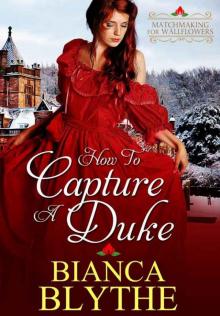- Home
- Bianca Blythe
Mad About The Baron (Matchmaking for Wallflowers Book 4)
Mad About The Baron (Matchmaking for Wallflowers Book 4) Read online
Mad About The Baron
Bianca Blythe
Mad About The Baron Copyright © 2017 by Bianca Blythe.
Contents
Acknowledgements
Chapter One
Chapter Two
Chapter Three
Chapter Four
Chapter Five
Chapter Six
Chapter Seven
Chapter Eight
Chapter Nine
Chapter Ten
Chapter Eleven
Chapter Twelve
Chapter Thirteen
Chapter Fourteen
Chapter Fifteen
Chapter Sixteen
Chapter Seventeen
Chapter Eighteen
Chapter Nineteen
Chapter Twenty
Chapter Twenty-one
Chapter Twenty-two
Chapter Twenty-three
Epilogue
About The Author
How to Capture a Duke
A Rogue to Avoid
Runaway Wallflower
Acknowledgements
Many thanks to everyone who helped me with this book! I would especially like to thank my editor, Allison Wright, my copy editor, Kimberly Cannon, and my cover artist, Angela Waters.
Chapter One
Scotland
January 1818
Grooms were not supposed to abandon their brides at altars, and nobody seemed less inclined to act ungallantly than the wondrous, utterly splendid, Lord Bertrand Braunschweig, Baron of Wolbert.
Veronique Daventry, stepsister to the Duke of Alfriston, checked again that her train fanned dramatically behind her. The silk thread embroidered on the dress sparkled under the candlelight.
Perfect.
The vicar cleared his throat in a somber manner. “Are you certain the groom is arriving, lassie?”
“He’ll be here,” Veronique said.
One didn’t write a woman that one intended to marry her and then not bother to make an appearance at the chapel.
The vicar did not display the appropriate degree of confidence at the words, despite the frequency of Veronique’s assertions.
Never mind.
A lack of timeliness was not the worst quality in a man. What were mere minutes compared to an eternity of love? Her momentary discomfit at the vicar’s scrutiny would be more than worth it for the lifelong delight the baron would experience at glimpsing her for the first time.
Veronique had corresponded with Lord Braunschweig for two years, ever since he’d asked Mr. Simons for an introduction. No pleasure exceeded that of receiving a letter from him. She’d long memorized the exact sweep of his quill, the calligraphy often imperfect, as if he’d not been able to control his eagerness as he wrote her.
The wind swept through the cracked stained glass windows, and the vicar placed a blanket over his legs.
Veronique’s neck was cold. As were her arms. The problem with sheer, shimmering gowns that clung to one’s body in an alluring fashion were that they were in no way designed for the frigid Scottish temperature.
Catholics had been correct to insist on high collars and strategically placed vestments. Perhaps Veronique should have researched the elopement policies in France or Italy rather than Scotland.
No matter.
Maybe the man was lost. He was Austrian. He could be forgiven for being befuddled by the novel landscape of the Highlands. The poor baron must be beside himself with agony.
The vicar coughed, the noise amplified by the chapel’s acoustics. “When you wrote me to say you desired a wedding, I imagined you’d be bringing more people to witness the event than your maid.”
“She is a good maid.”
“Most women bring their family to such occasions, lassie. Surely you must be in possession of a single acquaintance?”
She thought of her family, settled in Lord Rockport’s parlor, blissfully unaware she was marrying a few yards away. Likely they were sipping tea and debating the merits of haggis.
She wanted her first meeting with her future husband to be alone, and not in the presence of her loud-mouthed relations. “Their company is not required.”
The vicar scrutinized her. “Your accent is foreign.”
She shivered, but steeled her features. She refused to succumb to the faint doubt that threatened to appear whenever people examined her skin tone too closely, no matter how smugly their lips turned up when they decided they had an advantage over her.
She would not allow this man, charged with ministering a small population in a remote mountainous village, to think himself superior to her. Tens of thousands of women adored her work.
“Your letters arrived from the former colonies,” the vicar continued, but it was more of a question than a statement, and she turned away.
The outline of Diomhair Caisteal, a grandiose compilation of steep walls and narrow turrets, loomed through the few window panes not graced with stained glass. Her stepsister, Louisa, had recently wed Lady Rockport’s brother, and her stepmother had become so overcome with emotion, that she’d succumbed to Veronique’s pleas to accompany her family to the British Isles.
She smiled. They’d be so delighted when she presented her new husband to them.
Her stepmother frequently lamented the challenge of finding Veronique a fiancé, and she’d long dreamed of surprising them with a husband. Her skin tone might be unconventional, but that wouldn’t stop her from romance.
The vicar continued to direct a disapproving look in her direction, but she refused to yield to any unfounded misgivings he might have.
Veronique addressed her maid. “Please search for the baron in the village.”
“Very well, miss.” The girl dipped into a curtsy.
“Tell him to hurry.” Veronique glanced again at the vicar who stood near the candelabras, as if hopeful for warmth.
“The chapel is on a hill,” the vicar said sternly. “It would be highly unlikely for the man to miss it. If he were to overlook so commanding and elegant a structure as this chapel, it might signify greater troubles in your marriage.”
Veronique frowned. Her stepbrother was a duke, she was engaged to a baron, but more than that, she was wealthy and esteemed. Most people had heard of her, even if they were unfamiliar with her Christian name, and she summoned her most regal mannerism. “Is patience no longer a virtue to be lauded?”
“Well—” The man’s face reddened, perhaps aided by a habit of sipping whisky and wine.
She shrugged.
The baron would arrive.
He needs to.
Chapter Two
Nothing in the world surpassed a carriage ride through the Scottish Highlands in utter intolerability. The constant, unpredictable swerve of the mail coach, coupled with the distinct lessening of interior standards compared to its English counterparts, rendered the experience insufferable.
Miles thanked his ancestors for having the foresight to plant an estate in a more sensible region: Kent. The county’s green hills never ventured into mountainous territory.
Unfortunately Miles’s half-brother’s ancestral line had shown considerable less foresight, which had led to Miles’s current predicament. He strove to counteract the crisis by the most efficient means possible: feigning sleep.
If he shut his eyes long enough, perhaps actual sleep would occur, even if the other travelers seemed intent on hampering that possibility, exclaiming with an overabundance of enthusiasm over every view composed of goats grasping onto soggy slopes with their hoofs.
The passengers equaled him in Englishness—clearly Scotsmen possessed too much sense to
venture into one of these horrid contraptions.
If only he could ride his favorite horse here, yet he refused to submit Hercules to a long journey only to end in the icy gales and incessant sludge of the Highlands.
“Do you think that’s him?” A high-pitched voice squeaked with the vigor of a violin in the hands of a tone-deaf abecedarian.
Normally the shrill pitch might have discomfited him, though his mind was thoroughly occupied with her words.
“Whom do you mean?” a second soprano voice asked.
“Why Lord Worthing, naturally!”
Blast.
He resisted the urge to open his eyes. Or frown.
It had happened. They’d discovered him.
He’d thought he might be secure in Scotland. The war had ended two years ago, and he’d hoped people might have forgotten the depictions of him in heroic situations across the continent.
“It can’t be him. I always supposed Lord Worthing to be tall.”
Blood surged through Miles’s veins.
“Now ladies,” a third female voice, gruffer and riddled with a sarcasm indicating a woman in belief of a possession of intelligence said, “He is sitting.”
Perhaps this was their long-suffering mother. Or virginal great aunt.
“He is handsome,” one of the women across him mused.
Miles did not permit himself to smile. The chit had called him short. Forgiveness was not a state to be entered lightly.
“Though I did imagine his hair to be nicer,” she continued.
Some statements were intolerable.
Miles clenched his fingers, inhaled, and opened his eyes.
There were three of them: a plain-faced woman beside him, the severity of her face not lessened by her tightly pulled back knot, and two other women opposite him, attired in bright Scottish tartan. The garish fabric was the sort no actual Scotswomen would parade about in, but which some women in possession of an abundance of money, not bestowed with a similar abundance of sense, allowed their dressmakers to persuade them to buy.
“I am indeed Lord Worthing,” he declared, appreciating how their eyes widened and took on a familiar dewy expression that tended to occur right before certain chits dropped their handkerchiefs.
“How exciting,” the woman beside him said, creasing her gray dress as she leaned closer.
Definitely not a married woman. No man would tie himself to a creature so lacking in fashion sense.
Likely she was a governess, or a poor relative tasked to be the companion to children with whom the parents could not fathom conversing.
“It is most unfair to judge my hair when it is pouring outside.” He firmed his demeanor, summoning the aristocratic outrage his ancestors must have faced when confronted with the Normans’ invasion. “Even Brummel himself couldn’t help but have his coiffure look inelegantly tousled.”
The chits should have looked ashamed: that was the natural reaction to being chastised.
Instead they beamed, the fact highlighted by their generous application of vermilion. “It’s truly you.”
“Naturally.”
“Thank you, heavens,” the chit opposite him shouted, flinging her nondescript brown curls to the side. Her sister, judging from the similar hair shade, refrained from speaking, though she did clap.
Loudly.
He eyed them warily. This was no time for joy.
He drew himself up, emphasizing the length of his torso when he was not occupied with attempting sleep, and directed his loftiest stare at them. “No one could feign my appearance.”
They had the audacity to giggle, and Miles scowled.
“We were thinking you might be here,” the first chit confided.
“Why ever would you think that?” Horror surged through him. This was Scotland. Not a battlefield. Not a war tattered town. Not even Mayfair.
He didn’t desire to get the reputation of a man who frequented this dismal land. There was no war for him to report on, only brownish grassland gorged with goats.
And perhaps one anonymous authoress.
“Your half-brother lives near here. Lord Rockport,” she added, as if he might have forgotten the name.
Miles crossed his arms.
“We were hopeful you might be visiting,” she continued, “and here you are.”
“How nice for you,” he said.
“Yes,” the woman across from him assented. “We’ve been in Scotland for months, but this will make everyone the most jealous.”
“An emotion important to spread.” He waited for their faces to pale, but they blinked up at him, their faces still adorned with unwavering smiles.
“You are quite one of my charges’ favorite celebrities,” the woman beside him confided. “They’ve expressed admiration for the chiseled features of your face.”
Miles relaxed slightly.
His features were impeccable.
Maintaining a stony expression was more challenging than he’d assumed. He wondered at his tutors’ ability to emanate arrogance with unflappable consistency. Though then again, likely they had never been subjected to such blatant flattery.
Still, he could not reward the women with conversation for being in possession of eyesight, and he refrained from gracing them with a smile.
They still hadn’t mentioned his actual accomplishments, ones that surpassed even his ability to maintain a modicum of suavity.
There’d once been a time when he’d traveled around Europe, evading cavalry charges and blue-garbed Frenchmen brandishing muskets. That had been a bloody good time.
He hadn’t fought, but he’d done something better: he’d reported the news to the world.
Now there was no war. Bonaparte had capitulated, and Miles was back in Britain. His editor had assigned him to find a woman calling herself Loretta Van Lochen.
It was a hard fall.
Such frivolities held no interest to him. Unfortunately her undeniable fame interested his publisher, who desired to expand the newspapers female readership.
If only the English government possessed less skill at diplomacy, and he might visit a region which was not habituated mainly by livestock.
Miles was famous for reporting in the midst of danger, but not for writing about…novelists.
Particularly of penny dreadfuls.
“Since we are acquainted with your name,” the woman beside him said, interrupting him from his gloomy musings, “I must take it upon myself to introduce myself—and my charges—to you.”
Miles frowned. He favored resuming an attempt at sleep.
“I am Miss Hesper Haskett.” She lingered on her salutation, emphasizing her unmarried status, as if urging him to change it.
“I see,” Miles replied icily.
Etiquette might dictate that he should express some pleasure at meeting her, but he’d never been one for propriety, especially for people who questioned his attractiveness.
“These are my charges: Miss Theodosia Fitzroy and Miss Amaryllis Fitzroy.”
“Our parents didn’t want us to travel in the same carriage as them,” Miss Amaryllis Fitzroy said gaily. “Apparently we are quite talkative!”
Miles composed his face into the sort of stern expression his father had never possessed, choosing instead to channel the austere gaze of his instructors.
There had to be some advantages to attending Eton beyond the memorization of Virgil.
Miss Haskett continued to stare at him, and unease trickled through Miles. Did Miss Haskett’s scrutiny need to be so unwavering? Miles was certain there had once been greater space between them, not that the coach could be described as expansive. Perhaps the Scottish owners had desired to economize, or perhaps the Scottish were narrower-hipped than their English counterparts, owing to the prevalence of inedible dishes such as haggis and black pudding.
Miss Haskett’s charges still seemed affected by his presence, judging from their glazed eyes.
Miles directed his vision downward.
Perhaps pushin
g his arms against his chest emphasized the broadness of said chest or the muscular form of his arms. Indeed, some women might even find his stony expression appealing, bequeathing him with mystery.
“The coach driver informed us there will be another stop before we reach the coast.” Miss Haskett gazed meaningfully at him. “Wouldn’t it be pleasant to partake in some repast at the posting inn?”
“Well…” Miles was perhaps hungry—not that he would confide that to Miss Haskett.
“We can all dine together!” Miss Theodora Fitzroy clapped her hands.
“Lord Worthing is a baron,” Miss Haskett replied. “He is a man of much importance and may be reluctant to dine with ladies who have not even debuted yet.”
“Oh,” the chits’ gleeful expressions rearranged themselves to something resembling devastation.
“Though perhaps…” Miss Haskett leaned nearer him, and a thick floral scent invaded his nostrils. There could be no earthly reason for the scent of roses to be quite so potent in this tiny carriage, all the way in the Highlands in the middle of January. She tossed her head. “The baron likely favors dining with me.”
“As a matter of fact—” Miles doubted the propriety of having the gap between them be so thoroughly narrowed and edged nearer the window.
“You can regale me with stories of your adventures.”
“Well…” He strove to find an excuse to dine alone.
“Do you not adore posting inns?” Miss Haskett remarked. “Especially in this region. They are always so…empty.”
Miles firmed his expression. Thank goodness for gloves. No need to for anyone to see blood rushing to his wrists before he clenched them.
He knew what this woman desired.
She wanted him to take her to such a room—and then be discovered by her charges.
He scowled. He refused to be compromised. That was something that happened to other aristocrats.
He was a former war correspondent. Perhaps now there was no use for him to work abroad, but one day there would be.
The chits chattered on, and eventually the coach slowed and pulled into the posting inn.

 The Earl's Christmas Consultant
The Earl's Christmas Consultant A Holiday Proposal (Wedding Trouble Book 6)
A Holiday Proposal (Wedding Trouble Book 6) The Earl's Christmas Consultant (Wedding Trouble Book 3)
The Earl's Christmas Consultant (Wedding Trouble Book 3) A Kiss for the Marquess (Wedding Trouble Book 5)
A Kiss for the Marquess (Wedding Trouble Book 5) My Favorite Duke (The Duke Hunters Club Book 2)
My Favorite Duke (The Duke Hunters Club Book 2) The Sleuthing Starlet Mysteries
The Sleuthing Starlet Mysteries Lords, Snow and Mistletoe
Lords, Snow and Mistletoe The Body in Bloomsbury
The Body in Bloomsbury How to Capture a Duke (Matchmaking for Wallflowers Book 1)
How to Capture a Duke (Matchmaking for Wallflowers Book 1) Don't Tie the Knot
Don't Tie the Knot Dukes Prefer Bluestockings
Dukes Prefer Bluestockings A Marquess for Convenience (Matchmaking for Wallflowers Book 5)
A Marquess for Convenience (Matchmaking for Wallflowers Book 5) Lords, Snow and Mistletoe: A Regency Christmas Collection
Lords, Snow and Mistletoe: A Regency Christmas Collection Don't Tie the Knot (Wedding Trouble Book 1)
Don't Tie the Knot (Wedding Trouble Book 1) The Perfect Fiancé (Matchmaking for Wallflowers Book 0)
The Perfect Fiancé (Matchmaking for Wallflowers Book 0) A Rogue to Avoid (Matchmaking for Wallflowers Book 2)
A Rogue to Avoid (Matchmaking for Wallflowers Book 2) Mad About The Baron (Matchmaking for Wallflowers Book 4)
Mad About The Baron (Matchmaking for Wallflowers Book 4)